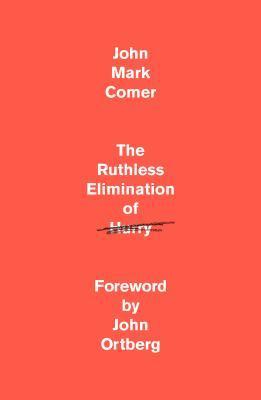The Ruthless Elimination of Hurry
by John Mark Comer
Waterbrook Press (2019)
There is a distinct irony with writing this book review heading to a busy conference on a long-haul flight. But perhaps this is exactly why it is a good book for our modern culture. While the pandemic has certainly changed the dynamics around “busyness” over the past years—and this book has been woefully overshadowed by COVID—the underlying characteristics of Hurry that this book aims at are ever more present as we exit the active stages of our COVID pandemic and attempt to catch up on the past two years.
The Ruthless Elimination of Hurry is a deep reflection on the challenge of modern life—although there are hints that this is a universal human predisposition rather than a uniquely modern challenge. The book is peppered with the author’s—John Mark Comer—autobiographical account of hurry and burnout with his outwardly successful megachurch, and his ongoing conversations with his quasi-mentor John Ortberg (17).
The book moves through three distinct sections. Firstly, a solid analysis of our predisposition towards speed and hurry. Secondly, some approaches towards a solution. Then thirdly, some active practices for “unhurrying your life.” Throughout the book the diagnosis of our situation is clear, as he quotes from Byung-Chul Han “[the Western world is] too alive to die, and too dead to live.” (9)
The response to this diagnosis is clear, with the titular line coming from John Ortberg’s mentor, Dallas Willard: “Hurry is the great enemy of spiritual life in our day. You must ruthlessly eliminate hurry from your life” (19). But eliminating hurry is easier said than done, as our modern society has baked in our predilection for speed into everyday life. From smartphones which are touched on average 2,617 times a day (36) through to advertising which persuades us that busy is better.
What is the solution that Comer offers? Drawing on biblical themes and Jesus’ example he emphasises the finitude of humanity, and the vastly disparate prioritisation of the time that we have. As he observes we often say we are “too busy,” and yet the average American spends 2,737.5 hours a year watching TV (72).
The solution then? Take the easy yoke of Jesus. A Jesus centred rule of life. Often “rules of life” are treated with suspicion by evangelical Anglicans, yet as Comer offers, they are a trellis for our lives. “The point of a trellis isn’t to make the vines stand up straight in neat rows, but rather to attain a rich deep glass of wine. It’s to create space for the vine to grow and bear fruit.”
With that diagnosis and prescription, Comer moves to the final portion of the book: four practices for unhurrying. Helpfully alliterated for our sermon centric ears, these are: silence and solitude, Sabbath, simplicity, and slowing. Each of these points digs deep into Jesus’ life described in the gospels and sees how His practice can be applied to our lives.
Throughout the book Comer is friendly and laconic and comes across as a mentor rather than a sage. While the examples are firmly American-centric, it is not hard to translate these for any modern context. At times the book feels a little “self-help-y,” although that is likely a product of the proliferation of self-help books on the market. Nevertheless, this is a helpful read, diagnosis, and engagement with our hurried lives. Perhaps on a busy flight is the best place to read this, it has certainly given me a lot to think about.
It isn’t a quick “life hack for the soul” (12) and nor does it claim to be. It is not exactly short at 286 pages, but instead it aims for deep formation. As Comer sagely reflects “Life is extraordinarily complex. Change is even more so. Anybody who says differently is selling you something.” (
